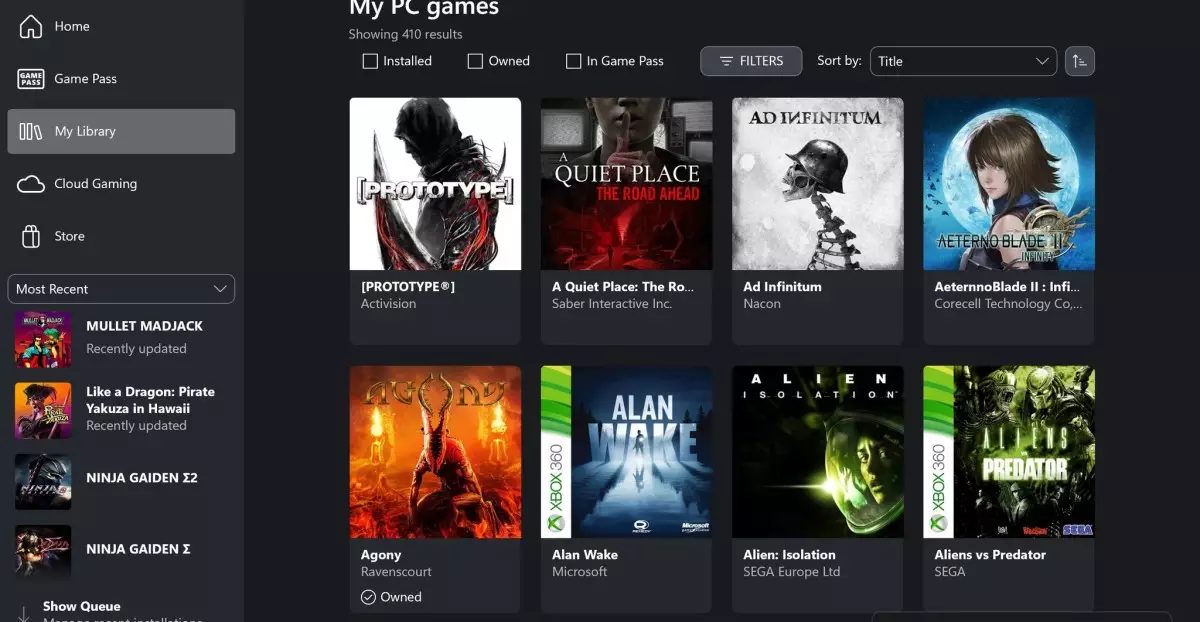The landscape of gaming is on the brink of a significant transformation, particularly with Microsoft’s latest moves to intertwine its Xbox and Windows platforms. Gaming enthusiasts and industry insiders are buzzing with speculation as subtle but impactful changes have begun to manifest within the Xbox app on Windows. It’s not merely an intriguing development for gamers; it signals a larger strategy that could redefine the gaming experience across all platforms under Microsoft’s vast umbrella.
Convergence of Two Platforms
Recently, users have reported seeing Xbox console titles appear in the Xbox app on Windows—a feature that raises eyebrows and questions about Microsoft’s intentions. While the app showcases these games in the “My PC Games” category, one should note that not all titles are playable on PC. For instance, even though users who own games like Alan Wake for Xbox 360 can see it, installation remains off the table. This is far from a simple glitch; it appears more like a deliberate stride towards a comprehensive gaming ecosystem. Tom Warren, a seasoned tech journalist, has been vocal about this, positing that these changes are all part of Microsoft’s grand vision for a unified library that caters to both Xbox and PC gamers.
This strategic convergence extends beyond merely displaying game libraries. Microsoft seems poised to embrace versatility by considering the integration of Steam and Epic Games titles into the Xbox app. Such a move would not only enhance the app’s utility but potentially disrupt the current competitive landscape, inviting other game distribution platforms to rethink their strategies. It is an ambitious plan that could set new benchmarks for how games are accessed and enjoyed across devices.
A Visual Symphony of Xbox and PC
The recent rebranding efforts have not gone unnoticed either. Referring to the Xbox app simply as “Xbox PC” signifies a departure from previous branding and suggests a more cohesive identity. This shift was accentuated during Microsoft’s announcements of new releases like Gears of War: Reloaded, indicating that the company is keen on aligning its branding to reflect its evolving vision. As the app becomes the central point for PC gaming, the incorporation of unified branding will likely enhance visibility and foster better engagement among users.
Furthermore, any mention of rumored new handheld devices highlights Microsoft’s ambition to extend its gaming ecosystem into the portable gaming space. With competitors, notably Lenovo, showing interest in proprietary gaming operating systems like SteamOS, Microsoft cannot afford to lag. The potential merging of Xbox’s strengths with Windows capabilities to develop innovative handheld devices could capture a growing segment of gamers who prefer mobile solutions. This is a clear response to a demand that is only rising within the gaming community.
The Cloud: The Lifeline for Compatibility
In the midst of these promising developments, an elephant in the room persists: the playability of Xbox console titles on PC. While the idea is alluring, achieving seamless compatibility might hinge on Microsoft’s formidable cloud infrastructure. Cloud gaming technology has advanced significantly, and leveraging these resources could allow gamers to enjoy console titles on their PCs without worrying about hardware limitations. Unless Microsoft succeeds in introducing effective emulation for older titles, the dream of cross-platform play could remain just that—a dream.
While many questions loom regarding the full scope of these developments, Microsoft’s commitment to creating a more interconnected gaming ecosystem is commendable. The impending Xbox app updates and the pursuit of innovative gaming solutions suggest that the company is not just reacting to current trends but is also looking forward. In a rapidly evolving tech landscape, such initiatives can mean the difference between leading the charge and playing catch up.
Many in the gaming community are now left pondering: Will Microsoft’s ambitious plans lead to a gaming utopia? If executed flawlessly, the fruits of this convergence could usher in an era rich with possibilities for all gamers. For now, what seems certain is that Microsoft is carving a path that may well redefine how we play, share, and connect in the world of gaming.

